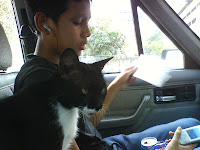Hello, everyone.
I know that it has been a long time since I lasted posted on my blog. Life has just been so hectic lately, and I haven’t really had a chance to balance everything. My goal every day is to write, and that has been taking up most of my time lately, even if the day is hectic. I savor the moments I have writing. And, I savor this one. There’s something enjoyable about writing a story, and writing here. Something about expressing yourself, and creating something out of nothing, I suppose. (c) iSMAIL de' Lucia.....!~

LEARNING TO READ IS A milestone for every child. Naturally,it's also a cause of celebration for parents who are only to aware of the importance of literacy.
Teaching a child to read, though, is an enormous task. Parents have to provide a conducive environments for the learning process to take place and the tools to perpetuate the habit.
Numerous ways have been adopted to expedite this process; some people start even when their young are still in diapers, from flashing cards containing isolated words to getting them familiar with alphabet book early in their childhood.
What is sometimes forgotten is the stress involved on the part of the child. When the ability to read is obtained at a slower rate than anticipated or hoped for, parents tend to push their child, sometimes to the edge, and this can lead to problems later on.
"The best way to motivate a child is to give them a sense of achievement." Children are by nature success-oriented and the easiest way to help them learn a skill is to make sure that they succeed step by step before aiming for greater heights.

"Learning to read, for instance, should be done in the most natural way, though the child's experiences which is later translated into words and meaning."

Another example is speaking. A child learns the verb 'drink' for example, through demonstrations, and when they have seen enough models to make the appropriate association with the words, they will be ready to use it. Parents should then provide ample opportunities for the child to practice saying the word and not reprimand them if they get the pronunciation incorrect which may cause negative reperesentions
The tools applied to learn reading in any language should utilise a similar approach-sentences or words used in books should be both repetitive and predictable with illustrations to provide clues for the child to make the required association through experience with the subject matter.
Learning progressively is the key here and a lot of patience is required because children learn at different rates and no single method suits every child.
It does not matter if your child starts of with a book that contains few words but lots of illustration. They will feel motivated to learn more once they had gotten over that stage of learning and ready to proceed further.

Learning words through association with experiences will help a child read in context, which is what learning words through flash cards cannot do.

That is why occasionally come across a child who can read an entire page without understanding what they has just read. When a child has learn to read in context, they can then develop their own reading strategies similar to an adult's technique of reading. They will then begin to discover the meaning of unfamiliar words.
This approach of reading , but one which is sadly overlooked perhaps due to the lack of materials or time constraint among them.












